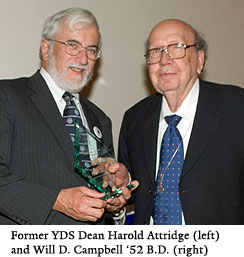Will D. Campbell ’52 B.D.—acclaimed author, civil rights activist, and self-described “bootleg preacher”—died on Monday, June 3 at the age of 88 in Nashville, TN. He died from complications following a stroke, according to an account from his close friend John Egerton, a Nashville writer and historian.

Richard Stazesky, secretary of the YDS Class of 1952, said of Campbell, “He was, without a doubt, the best known, most famous, member of our class.”
Honored in 2007 with Yale Divinity School’s William Sloane Coffin ’56 Award for Peace and Justice, Campbell was the author of 17 books in addition to numerous articles in journals and magazines. His first book, published in 1962, was Race and the Renewal of the Church. His 1977 book Brother to a Dragonfly, which chronicles the civil rights movement, was a National Book Award finalist. President Clinton honored Campbell with a Presidential Humanities Medal in 2000, and he was given lifetime achievement awards from the American Civil Liberties Union of Tennessee and the Tennessee chapter of the National Conference of Christians and Jews.
Ray Waddle, a friend of Campbell and editor of Reflections, YDS’s magazine of theological and ethical inquiry, said, “To so many of us, Will was a friend, mentor, chaplain, a kind of spiritual guerrilla strategist against all sorts of conventional wisdom about faith and culture.
“Always working at the ecclesiastical margins, Will was a ‘sect of one’ who managed to speak a Christian message of reconciliation of everyone. At his Anabaptist core he was a Southern dissident against forces that victimize poor people. Those forces include prisons, racist politics, even churches.”
Campbell called himself a “bootleg preacher,” and over time a number of other labels were attached to him, including, for example, “renegade preacher,” “civil rights legend,” “iconoclastic storyteller,” “anti-institutional crusader,” “hardscrabble farmer,” “radical prophet of the South,” and “Redneck Preacher.”
In reporting Campbell’s death, Egerton said, “His condition had been declining gradually for the past month, and turned suddenly critical over the weekend. Brenda [Campbell’s wife] and their three children—Penny, Webb, Bonnie—and Bonnie’s son, Harlan, the eldest of the four grandchildren, were all with him throughout most of Monday, reconciled to his approaching death, knowing that it was time. He had fought for two years to recover from the May 2011 stroke that disabled him, and he was weary of the struggle. In a last act of benevolence, Will spared them all the anguish of a long and traumatic last watch. For him and for his family, his departure was not a cry of despair; it was more like a whispered sigh of relief. Finally, he is at peace.”
Waddle, who was religion writer at the Nashville Tennessean for many years before assuming his position with Reflections, recalled that Campbell once said, “In my judgment, the problem with Christianity in our nation is not that enough people love Jesus – the problem is that everyone loves Jesus. The cross has been shined up, pretty.”
Said Waddle, “He always returned to a rudely simple idea: Ideological schemes and doctrinal purity are irrelevant because God has already made reconciliation possible. Our work is to spread it around.”
Dean Lewis ‘53 B.D. agrees: “Will was one of that group of Southern Baptists, myself included, who entered YDS in the fall of 1949. All the rest of us ended up Presbyterians but Will never did. I don’t know if the Southern Baptists of today would claim him but he was faithful to the Baptist precept of soul liberty indeed.”
Brought up poor in Mississippi, Campbell was among only four white ministers to escort nine African American students through angry mobs during school desegregation in Little Rock, Arkansas, and he was the only white person present at the formation of the Southern Christian Leadership Conference. However, he also ministered to members of the Ku Klux Klan and made a prison visit to James Earl Ray, the convicted assassin of Campbell’s colleague and friend Martin Luther King, Jr.
After graduating from YDS, Campbell became pastor of the Taylor Southern Baptist Church in Taylor, LA and then was named director of religious life and chaplain at the University of Mississippi. In 1956 he took over leadership of the Southern Project in the Department of Racial and Cultural Relations of the National Council of Churches. From 1962-86 he was executive director of the Committee of Southern Churchmen.
In recent years, the Campbells lived on a 20-acre farm outside Nashville.
The New York Times on the death of Campbell: http://www.nytimes.com/2013/06/05/us/will-d-campbell-maverick-minister-and-civil-rights-stalwart-dies-at-88.html
Campbell was featured in a PBS Documentary, “God’s Will”: http://vimeo.com/55126898
| Attachment | Size |
|---|---|
| 3.48 KB |